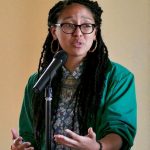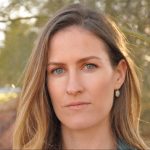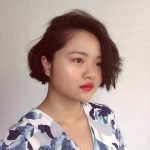For an emerging poet like myself, National Poetry Month validates every line that my mind conjures and punches into my phone on the L train. It is an entire thirty days devoted to a craft that my immigrant parents will never completely understand—hell, sometimes I may never fully understand the pull to arrange words together to say something about myself, the world around me, and my experiences in it. But if interning at CLMP has taught me anything, it is that community is essential—I mean c’mon, that’s what the C stands for—especially in small publishing and writing. Therefore, I was delighted to interview ten poets who have been published by CLMP members and associates, about National Poetry Month and other literary topics. Poets of various ages, backgrounds, and poetic stages, Allison Hedge Coke, Ariana Brown, Caitlin Roach, Danielle Boodoo-Fortune, F. Douglas Brown, Natalie Wee, Nico Amador, Mather Schneider, Rami Karim, and Tom Haviv, each of whom make up the poetry community, my community.
— Merita Lubani
How do you define yourself as a poet?
Allison Hedge Coke: “Poetry is breathing. The world and universe are going on all around us all the time. Being a poet is holding in the inhalations, the music of the world, the beautiful and the horrendous, long enough to translate a bit of it into experiences on the page or in the air into a shared breath, maybe. If we are lucky enough to be dedicated to it. I am a human being. The poetry speaks to me, opens me in ways I would otherwise be reclusive and lets me tangle with the mess of the world to filter through it seeking both depth and joy, seeking meaning, the labor of life, forgiveness, love, brilliance, truth, understanding effort, conflict, pain, loss, epic journey, and in the end seeking resplendence. I am definitely seeking song-story and darkening light. So maybe I am a resplendence seeker as a poet.”
Nico Amador: “For me, being a poet is about choosing an identity that I get to have on my own terms, a way of making a space where I don’t feel a need to defend who I am or fit myself into other people’s ideas of what I should be. It’s about staying brave, and aligned under the pressures of assimilation. A way of reminding myself where my loyalties are — like, hey, yeah, I’m with the weirdos, the outcasts, the visionaries, the people our society sees as disposable — that’s where there’s real energy and opening for thought outside the dominant paradigm.”
What’s your favorite poem that you’ve written? In which publication? Why?
Caitlin Roach: “I go through cycles of liking and not liking my poems, so I don’t trust I have a favorite. But one of the most personally meaningful poems I’ve written is a poem titled “Exit,” which appears in the current Spring 2018 issue of the Colorado Review. I struggled with eating disorders for 15 years, and “Exit” that was the first poem to land on the other side of that suffering. For a long time I was certain I would never write about it; I thought I’d never be able to break myself away from it and so never wanted to let that secret out. Having real, material distance from that suffering felt, and feels every day, like a miracle. “Exit” is an artifact of that healing, and writing that poem and subsequently sending it out was a big risk for me, one that wasn’t easy to sit with.”
Natalie Wee: “My personal favourite is “Phoning Home to Tell My Grandmother I Survived a Hate Crime,” published in The Margins with the Asian American Writers’ Workshop.
It’s one of the most agonizing things I’ve ever written because of the emotional labour it took to distill something so painful into language that could be understood. Writing this poem involved drawing links between deep historical, generational, and cultural trauma. As I was writing it I had the sense that I was speaking not only to my grandmother, but also to a younger version of myself and young Asians existing in white-dominant spaces. I didn’t realize until after I had written it that this work was a testament to my survival as much as it was a commentary on the racial violence to be survived.”
How do you celebrate National Poetry Month? How do you recommend others (readers, small publishers, writers) celebrate National Poetry Month?
Rami Karim: “Read new writers. Commit to a single project and complete it this month. Engage other mediums and immerse yourself in new and/or stimulating experiences, which could yield beautiful and felt writing. As for publishers, seek out and support writers who haven’t yet been published.”
Danielle Boodoo-Fortune: “Every year I try to do the poem-a-day challenge for Poetry Month, and quite honestly, I never make it to thirty poems. Still, I always find it to be an intense and fruitful process, and sometimes just the fire I need. Some of my favourite poems from Doe Songs started as bits and pieces of writing during Poetry Month. I also look forward to following other poets’ progress during the month, and I love when journals, blogs and other publications feature the work of poets on the journey. It feels more like a movement for the love of poetry and less like an isolated exercise.”
For Poem in Your Pocket Day, which poem will you be carrying and why?
Nico Amador: “There’s an excerpt from the Octavio Paz poem “A Tale of Two Gardens” which has become a kind of mantra for me, especially when I feel despair about the destruction of the natural environment, about the violence of racism, empire, poverty, transphobia, about the sense of futility that comes with engaging in any kind of struggle against those things. To me this poem represents the possibility of holding onto beauty and using that to carry through a desolate time:
Mineral cacti,
quicksilver lizards in the adobe walls,
the bird that punctures space,
thirst, tedium, clouds of dust,
impalpable epiphanies of wind.
The pines taught me to talk to myself,
In that garden I learned to send myself off.
Later there were no gardens.
”
F. Douglass Brown: “I’m thinking a poem that celebrates the daily: “Living,” by CD Wright or “The Day Lady Died,” by Frank O’Hara. Last semester I kept Ross Gay’s poem, “Feet,” with me everywhere I went (workshops, readings, etc.). This semester the Natasha Trethewey poem “Genius Narcissis,” has snuck its way into my everywhere. Maybe because I’m still mourning my mother, and the “slender stems” the poem alludes to, are the many slender moments I have been recalling.”
What advice can you give to emerging poets like myself?
Natalie Wee: “Be persistent, read widely, and keep working on being the best version of yourself. It’s a long road, and often a very lonely one, so be sure to build community as well and I don’t mean just with writers you admire, but also other emerging writers and people who share enthusiasm about the same things. Do what you must to stay safe and protect yourself. Most importantly, it’s very difficult, but try not to base your self-worth on measures like, “I got published in X” or “I wrote X poems today.” Your productivity doesn’t have any bearing on your worth as a human being. And I say this because it’s something I struggle with, too.”
Ariana Brown: “Trust your instincts and allow yourself the patience and time to discover your voice. As you are doing so, figure out who your audience is. Who are you writing for, and why? How does that change the content and delivery of your work?”
What are you working on right now?
Mather Schneider: “For the last few months I have been writing a book of prose, a free-form novel, a fictional account of my experiences with my wife in Tucson and our subsequent move to Mexico and the life we have here now, which is far from ideal. Hermosillo isn’t Cabo San Lucas by a long shot. There is some cross-over with the subject matter which I dealt with in the chapbook, “A Bag of Hands.” The manuscript sits at 90,000 words and is called THE BACANORA NOTEBOOKS. It is sort of a mix between John Fante’s “Ask the Dust” and Roberto Bolano’s “The Savage Detectives.” I have been submitting excerpts from it and have received a few acceptances, nothing big, but I do have hopes for this book, I think it’s the best thing I’ve ever written.”
Tom Haviv: “I am working on finishing my first book of poetry, A Flag of No Nation, which is being published by Kaf Press. The goal of the book was to build a personal, and then universal groundwork–from the details of my family’s story in the Mediterranean–for a collective re-imagining of the future of Israel|Palestine. It came from a utopian idea, symbolized by the Hamsa Flag, which is a project I’ve been working on for the past few years. The flag uses a shared symbol of Jews, Muslims and Christians, Levantine people, Palestinians and Israelis– the Hamsa– in order to stand as a floating signifier for new forms of peoplehood, new social forms and paths for Jewish & Palestinian self/co-determination–beyond nationalism, maybe beyond statehood itself, toward alternate, un-tried political forms. The question is very open, and belongs to a much larger conversation, of many intersecting communities, that I wish to be part of. The Hamsa Flag itself is the core poem of the book–a totem of potentiality–that calls into question the distinctions of identities that have been hardened–and flattened–by our histories. The book is comprised of many forms: documentary poetry (oral history interviews about my family’s diaspora from Turkey to Israel|Palestine and beyond), performance prompts for the flag, and the creation myth, Island, in order to create the materials for a new and maybe permanently incomplete “epic”: a story of an imagined people–a lost people, a possible people. An epic for a moment in history when our collective myths are collapsing–even failing us. An “epic” that serves as a meditation on the impossibility of telling a story–after all that has happened. Unlike other “epics”, the book attempts to be anything but an essentialist tale; it strives to be a tale of ambivalence, of the subtlety & slipperiness of identity–constantly being made and unmade, never static.”
Thank you to all the poets who participated. A special congratulations to Douglas Brown whose daughter Simone Joy Brown was born during this interview process.
Allison Hedge Coke is the recipient of numerous awards for her books including Blood Run, Dog Road Woman, Sing: Poetry from the Indigenous Americas, and, most recently, Burn (MadHat, Inc., 2017). She is founding faculty for the VCFA MFA in Writing & Publishing program, and a Distinguished Professor of Creative Writing at the University of California Riverside. Twitter:@AAHedgeCoke IG: @allisonhedgecoke
Ariana Brown is a Black Mexican-American poet from San Antonio, Texas, currently working on her MFA in Poetry at the University of Pittsburgh. Her poems have been featured in Kweli Journal, African Voices, Rattle, and her most recent self-published chapbook, Messy Girl (2017) is sold out. Twitter & IG:@arianathepoet
Caitlin Roach teaches creative writing and literature at the University of Nevada, Las Vegas, where she is an assistant professor-in-residence. Her poems have appeared or are forthcoming in Poetry Northwest, West Branch, The Iowa Review, and other publications. IG: @caitlinaroach
Danielle Boodoo-Fortuné is a Trinidadian artist, poet, and recent winner of the Hollick-Arvon and Wasafiri poetry prizes. Her work has appeared in publications such as The Caribbean Writer, Anthurium: A Caribbean Studies Journal, Room Magazine, and her debut book, Doe Songs (Peepal Tree Press, 2018).
Douglas Brown is a writer, educator at Loyola High School’s English Department, and DJ. His works include his first book Zero to Three (2013 Cave Canem Poetry Prize) and his most recent ICON (Writ Large Press, 2018). Twitter and IG: @fdouglasbrown
Mather Schneider is a writer and former taxi cab driver from Tucson, Arizona whose works include Drought Resistant Strain (Interior Noise Press, 2010), He Took a Cab (New York Quarterly Books, 2017), and his recent chapbook, A Bag of Hands (2018), which was a Rattle Chapbook Prize Selection.
Natalie Wee, a Toronto resident born in Singapore to Malaysian parents of Peranakan descent, is the author of Our Bodies & Other Fine Machines (Words Dance Publishing, 2016). Her work has been published or is forthcoming in Drunken Boat, Asian American Writers’ Workshop, Prairie Schooner, and more. Twitter:@natweewriter
Nico Amador is a writer, community organizer, activist trainer, and poetry editor at Thread Makes Blanket Press. His poems have appeared in Poet Lore, Nimrod International Journal and his chapbook, Flower Wars, was selected as the winner of the Gloria Anzaldúa Poetry Prize and published by Newfound Press in 2017. IG: @nico.amador
Rami Karim is a writer and artist living in Brooklyn. Their work has appeared in Apogee, The Brooklyn Review and Tagvverk, among others. They are a 2017 Asian American Writers Workshop Margins Fellow, and their chapbook is Smile & Nod (Wendy’s Subway, 2018). IG:@rami_karim_
Tom Haviv is a writer, artist, and educator based in New York City, whose work has appeared in or is forthcoming in Fence, Conjunctions, Black Sun Lit, and elsewhere. He is also the co-founder of the Kaf Collective & Press, which will publish his debut book of poetry Flag of No Nation, and his first children’s book, Woven, in Spring 2018. Twitter and IG: @tmhaviv










